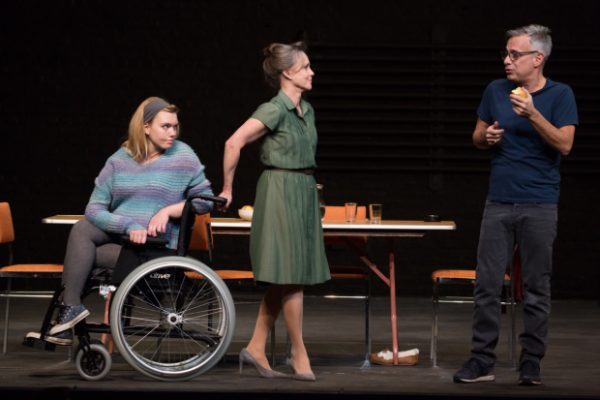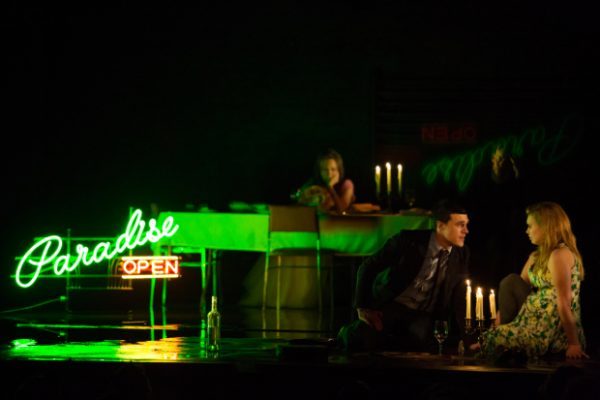
Madison Ferris, Sally Field, and Joe Mantello star in Sam Gold revival of THE GLASS MENAGERIE on Broadway (photo © Julieta Cervantes)
Belasco Theatre
111 West 44th St. between Sixth & Seventh Aves.
Tuesday – Saturday through May 21, $35 – $149
glassmenagerieonbroadway.com
How do twenty-first-century audiences relate to Tennessee Williams? Tony winner Sam Gold explores that question as he combines elements of two recent productions in his new Broadway version, continuing at the Belasco Theatre through July 2. In 2004, multiple Emmy and Oscar winner Sally Field starred in Williams’s The Glass Menagerie at the Kennedy Center, directed by Gregory Mosher. In November 2015, Gold directed a more experimental adaptation of the play for Ivo van Hove’s toneelgroepamsterdam company. And although the casting is curious, Andrew Lieberman’s set can be confusing, and too much of the staging is head-scratching, it mostly works, resulting in a fresh take on Williams’s most intimate and autobiographical play and the one that put him on the map. With the house lights still on, Tom Wingfield (award-winning actor and director Joe Mantello) takes the stage, with his mother, Amanda (Field), and his sister, Laura (Madison Ferris), in a wheelchair, waiting by a small staircase in front of the stage. “Yes, I have tricks in my pocket, I have things up my sleeve. But I am the opposite of a stage magician. He gives you illusion that has the appearance of truth. I give you truth in the pleasant disguise of illusion,” the graying Tom, looking relatively comfortable in jeans and glasses, announces to the audience. “The play is memory. Being a memory play, it is dimly lighted, it is sentimental, it is not realistic.” After Tom’s opening monologue, Amanda helps Laura up the steps; they’re a difficult few moments, as Ferris has muscular dystrophy. Lieberman’s depiction of the Wingfield home in St. Louis consists only of a kitchen table at the center, open shelving of various objects at stage right, and an old phonograph with records and some tiny glass animals on the floor at stage left, with large, empty spaces and black walls. For the next two hours (without intermission), Amanda prepares for Laura to meet gentleman callers while Tom has trouble writing and disappears at night, upsetting his mother, who descends ever more deeply into denial of what their lives have become. Meanwhile, an unseen portrait of her husband, who walked out on the family years ago, hangs ominously over them like a dark cloud.

Amanda (Sally Field) looks on as the gentleman caller (Finn Wittrock) and Laura (Madison Ferris) bond in dark version of Tennessee Williams classic (photo © Julieta Cervantes)
Williams’s breakthrough play, The Glass Menagerie takes its cues from Williams’s real life. His given name was Tom, he grew up partly in St. Louis, his father was a traveling salesman who was away for long periods of time, and his beloved sister, Rose — in the play, Laura recalls being referred to as “Blue Roses” in high school — suffered from extreme mental illness and ultimately underwent a lobotomy. Many of Gold’s choices go against traditional adaptations: Mantello (The Humans, Angels in America) plays Tom at his current age, not as the younger man, changing the dynamic between Tom and Amanda, particularly when they quarrel. Amanda is often an imposing, overbearing figure, but Field (Norma Rae; The Goat, or Who Is Sylvia?) gives her a heartbreaking vulnerability, a disillusioned woman who can’t see things as they are. Finn Wittrock (American Horror Story, Sweet Bird of Youth) turns the gentleman caller into a goofy young man with an innate charm who has an instant connection with Laura. But it’s the casting of Ferris as Laura — the first actor in a wheelchair in a major role on Broadway (in the 2015 revival of Spring Awakening, Ali Stroker became the first actor in a wheelchair ever on Broadway) — that most significantly alters the nature of this production. Laura is usually portrayed wearing a brace that hampers her movement as well as her belief that she will ever find a husband. So when Laura calls herself “crippled” and her mother responds, “Nonsense! Laura, I’ve told you never, never to use that word. Why, you’re not crippled, you just have a little defect — hardly noticeable, even!” it takes on different meaning here, since Laura’s mostly confined to a wheelchair. In other productions, when the gentleman caller asks Laura to dance, there’s a moment of hope, but here we’ve already seen it’s seemingly impossible, based on how difficult it is for Laura to even get up a few steps. But we mustn’t forget that, as Tom said at the very start, this is a memory play, so this is how he is remembering it. It’s a bold choice, one that some have argued goes against Williams’s meaning and others have claimed fits in with his intentions. It certainly makes things more uncomfortable, which is not necessarily problematic, as opposed to some of the staging, which is, including the spectacle that becomes the “nice cool rain,” characters running around the audience, and Amanda and Laura arguing over who is going to answer a knock at the door. But the play withstands such unconventional approaches; as crafted by Williams, it is a lot sturdier than the tiny glass animals that Laura collects.